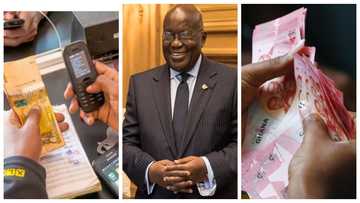E-Levy: Tax Analyst Outlines 6 Exemptions In New Law Available To Ghanaians
- There are six ways to reduce the impact of the Electronic Transaction Levy that are legally sound and above board
- These six ways are informed by existing exemptions provided under the E-Levy law and some general transactions that the tax does not cover
- Management and Tax Adviser, Fred Awuttey, has said while one of the ideas to beat the tax is good, it comes with the risk associated with carrying physical cash
PAY ATTENTION: Click “See First” under the “Following” tab to see YEN.com.gh News on your News Feed!
While many are worried about the impact of the 1.5% E-Levy on their incomes, there are six ways to legally minimise the risk of paying the tax and reduce its impact.
The implementation of the much-talked-about E-Levy starts on May 1, 2022, but YEN.com.gh reached out to a tax expert for some brilliant ideas on how to navigate the choppy waters of the unpopular Electronic Transactions Levy.
These ideas to minimise the risk of paying the E-Levy use exemptions spelled out under the law and transactions that it does not cover.

Source: Instagram
Here are the six full-proof ways to minimise the impact of the new tax:
Download YEN's news app on Google Play now and stay up-to-date with all major Ghana news
1. Chase the chequebook
Tax and Management Adviser at tax consulting firm, EM Tax Advisers Ltd, Fred Kwashie Awuttey, has said one of the easiest ways to reduce the E-Levy risks is to use cheques.
Clearing cheques by electronic means is exempted from the E-Levy tax, so it provides an excellent alternative to deal with the charges associated with the E-Levy.
2. Do 'physical' cash-in and cash-out
The E-Levy does not cover cash-out and cash-in made at the momo vendor. So there is the option of going to a momo merchant and asking them to deposit money into a particular momo wallet.
When the person withdraws (cash-out), they only pay the momo charges, not E-Levy.
"But, with this option, a person must be guided by the dangers of carrying a lot of cash along," Mr Awuttey warns.
3. Make payments through merchant shortcode (for shops and supermarkets)
The E-Levy does not cover payments made through a merchant's shortcode registered with the Ghana Revenue Authority to pay income tax and VAT.
So to minimise your exposure to the E-Levy at a supermarket or shop, first make sure that they have a merchant shortcode registered to the GRA.
You have to determine if the vendor is registered with the GRA before initiating the transaction.
4. Update bank, momo account details with the Ghana Card
The Executive at EM Tax Advisers explains that the E-Levy does not cover transfers between two or more accounts held by one person with a unique Ghana Card ID number.
"So to minimise the impact, individuals must update their bank accounts and mobile money accounts with the Ghana Card. This way,
they will not be affected by the tax when they transfer money from one account; say from their Vodafone wallet to their MTN wallet," Mr Awuttey has advised.
5. Regulate the volume of electronic payments at the bank
For the purpose of making payment by electronic platform through the bank, an individual may have to regulate the payment so as to minimise the impact of the new levy.
It is expected that the Minister of Finance determines the minimum threshold on the bank payment so that concerns on payment are addressed.
6. Pay your taxes through the Ghana.gov platform
Regarding payment of taxes, an individual must make use of the option of paying through the Ghana.gov platform.
This option is also exempt.
E-Levy: Main Institutions Mandated By The GRA To Deduct 1.5% From May 1
As the May 1, 2022, E-Levy implementation date approaches, the Ghana Revenue Authority (GRA) has released a list of key institutions that will charge the 1.5% tax.
GRA’s Head of Compliance of the Domestic Tax Revenue Unit, Victor Yao Akogo, told Joy News that apart from the main entities with the licence to issue electron money, other entities will deduct the tax on behalf of the Authority.
Bank of Ghana approved electronic money issuers like MTN Mobile Money are among payment service providers mandated to charge the 1.5% E-Levy.
Our manifesto: This is what YEN.com.gh believes in
Source: YEN.com.gh





